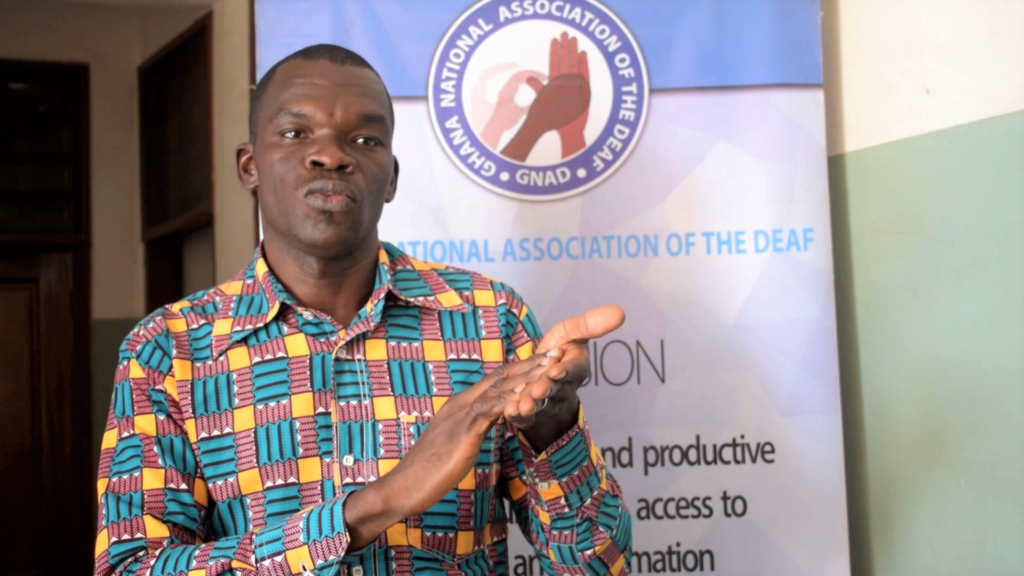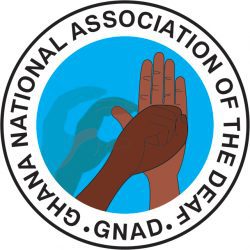The Ghana National Association of the Deaf (GNAD) is calling on the government to legally recognize the Ghanaian Sign language (GSL) as the official language of the hearing-impaired.
Communication remains a major barrier between the hearing community and the deaf as it impacts negatively on education, employment and health care of the hearing impaired.
The group is also appealing to the Ghana Education Service (GES) to ensure Sign Language is incorporated into basic school level curricula.
They made the call during a stakeholder's forum held in Kumasi.

Director of the association, Juventus Duorinaah says it is imperative for the country to recognize the Ghanaian Sign Language.
“The legal recognition of signed language differs widely. In some jurisdictions, a signed language is recongnized as an official language; in others, it has a protected status in certain areas (such as education).
“Article 29(6) of the 1992 constitution makes provision for the right of persons with disabilities, including accessibility needs of the Dead persons. Article 29(8) also mandates parliament to enact such laws as necessary to ensure the enforcement of provisions in Article 29(6).
“The UNCRPD emphasizes the right to use sign language in education. Article 24 and 24(3)(b) and (c) require State parties to ensure full and equal participation of deaf people by facilitating the learning of sign language and promotion of linguistic identity of the deaf community,” he said.

Most persons with disabilities in Ghana are stigmatized, marginalized and lack access to essential resources for their development.
Citing instances where a media coverage of the President’s inaugural speech had no interpreter, the association called on the media, especially private-owned, to have a wide display of the interpreter.
According to the deaf community, communication still remains a major hindrance and negatively impacts their access to quality education, employment and healthcare.
Marco Stanley Nyarko, a lecturer at KNUST and Emmanuel Assumadu, an entrepreneur, are amongst the over 110,625 deaf people in Ghana who have endured years of stigmatization.
Marco indicated “I have over 600 students I lecture with two interpreters in class. Sometimes, some students at the back do not pay attention. But, I mostly try to make the class more interesting so that they will all take part.
“The interpreters are positioned at vantage points to communicate whatever I have for the students. Sometimes, I decide not to let the interpreters keep mute so the students watch me sign to understand. It motivates them to learn”.
Emmanuel added “ I worked so many years for a pharmaceutical company, but sadly it collapsed. Finding a job afterward was quite hectic. I was denied access to a job, which I think was because of the lack of an interpreter. So, I decided to establish my own job”.
With inadequate sign-language teachers, accessibility to quality education for children with hearing impairment in Ghana has become a mirage.
Project Coordinator for the Ghana National Association of the Deaf, Kakra Ankobiah, urged the government and the general public to master the skills of sign language.
“The deaf cannot speak Twi, English, Hausa or any other. But, you can learn sign language. Let’s all learn the language to make them feel included in our society,” he said.
Latest Stories
-
Disregard Wontumi TV presenter’s misleading broadcast on Election 2024 voting date – EC
52 mins -
I’ve no plans to leave comedy for movie production, says Basketmouth
2 hours -
Akufo-Addo seeks to use Bawumia to complete Akyem Agenda– Asiedu Nketiah
2 hours -
‘Bawku conflict politicised for electoral gains’ -Martin Amidu alleges
2 hours -
‘Let industry players play the game ‘ – AOMC boss slams political interference in oil sector
3 hours -
Let’s learn from ExxonMobil, high flyers must lead the way for mergers – AOMC Boss
3 hours -
‘So many regulations, yet corruption prevails’ – Dr Riverson Oppong on OMC oversaturation
3 hours -
At least 24 dead after two boats capsize off coast of Madagascar
4 hours -
Madina MP lauds White Chapel Youth Group for championing peace ahead of elections
4 hours -
Man United settle for draw at Ipswich Town in Amorim’s first game in charge
5 hours -
GPL 2024/2025: Prince Owusu screamer earns Medeama win over Young Apsotles
5 hours -
BBC visits mpox clinic as WHO says DR Congo cases ‘plateauing’
5 hours -
Burning old TVs to survive in Ghana: The toxic trade in e-waste
5 hours -
Perfume boss admitted he ignored Russia sanctions
6 hours -
Wicked proves popular as opening set to be biggest for Broadway film
6 hours

